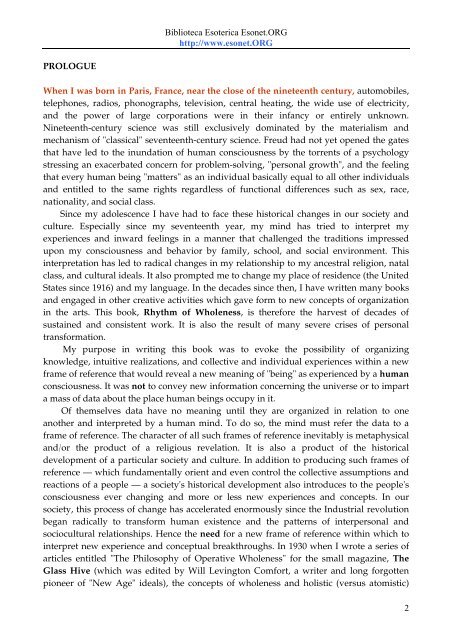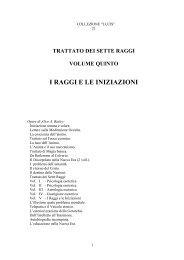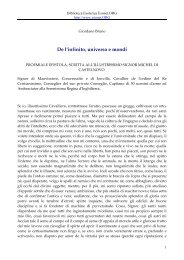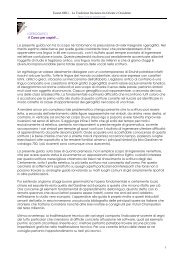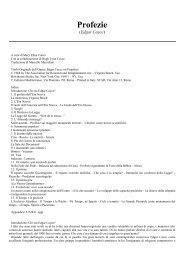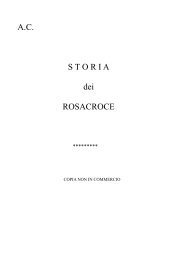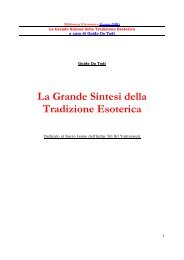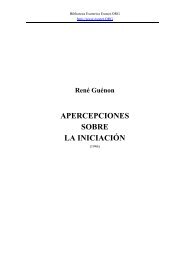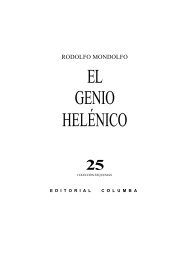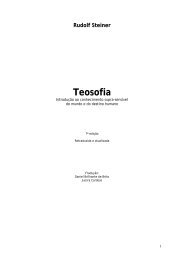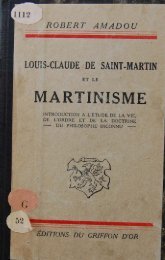Biblioteca Esoterica Esonet.ORG http://www.esonet.ORG 1
Biblioteca Esoterica Esonet.ORG http://www.esonet.ORG 1
Biblioteca Esoterica Esonet.ORG http://www.esonet.ORG 1
You also want an ePaper? Increase the reach of your titles
YUMPU automatically turns print PDFs into web optimized ePapers that Google loves.
PROLOGUE<br />
<strong>Biblioteca</strong> <strong>Esoterica</strong> <strong>Esonet</strong>.<strong>ORG</strong><br />
<strong>http</strong>://<strong>www</strong>.<strong>esonet</strong>.<strong>ORG</strong><br />
When I was born in Paris, France, near the close of the nineteenth century, automobiles,<br />
telephones, radios, phonographs, television, central heating, the wide use of electricity,<br />
and the power of large corporations were in their infancy or entirely unknown.<br />
Nineteenth-century science was still exclusively dominated by the materialism and<br />
mechanism of "classical" seventeenth-century science. Freud had not yet opened the gates<br />
that have led to the inundation of human consciousness by the torrents of a psychology<br />
stressing an exacerbated concern for problem-solving, "personal growth", and the feeling<br />
that every human being "matters" as an individual basically equal to all other individuals<br />
and entitled to the same rights regardless of functional differences such as sex, race,<br />
nationality, and social class.<br />
Since my adolescence I have had to face these historical changes in our society and<br />
culture. Especially since my seventeenth year, my mind has tried to interpret my<br />
experiences and inward feelings in a manner that challenged the traditions impressed<br />
upon my consciousness and behavior by family, school, and social environment. This<br />
interpretation has led to radical changes in my relationship to my ancestral religion, natal<br />
class, and cultural ideals. It also prompted me to change my place of residence (the United<br />
States since 1916) and my language. In the decades since then, I have written many books<br />
and engaged in other creative activities which gave form to new concepts of organization<br />
in the arts. This book, Rhythm of Wholeness, is therefore the harvest of decades of<br />
sustained and consistent work. It is also the result of many severe crises of personal<br />
transformation.<br />
My purpose in writing this book was to evoke the possibility of organizing<br />
knowledge, intuitive realizations, and collective and individual experiences within a new<br />
frame of reference that would reveal a new meaning of "being" as experienced by a human<br />
consciousness. It was not to convey new information concerning the universe or to impart<br />
a mass of data about the place human beings occupy in it.<br />
Of themselves data have no meaning until they are organized in relation to one<br />
another and interpreted by a human mind. To do so, the mind must refer the data to a<br />
frame of reference. The character of all such frames of reference inevitably is metaphysical<br />
and/or the product of a religious revelation. It is also a product of the historical<br />
development of a particular society and culture. In addition to producing such frames of<br />
reference — which fundamentally orient and even control the collective assumptions and<br />
reactions of a people — a society's historical development also introduces to the people's<br />
consciousness ever changing and more or less new experiences and concepts. In our<br />
society, this process of change has accelerated enormously since the Industrial revolution<br />
began radically to transform human existence and the patterns of interpersonal and<br />
sociocultural relationships. Hence the need for a new frame of reference within which to<br />
interpret new experience and conceptual breakthroughs. In 1930 when I wrote a series of<br />
articles entitled "The Philosophy of Operative Wholeness" for the small magazine, The<br />
Glass Hive (which was edited by Will Levington Comfort, a writer and long forgotten<br />
pioneer of "New Age" ideals), the concepts of wholeness and holistic (versus atomistic)<br />
2


